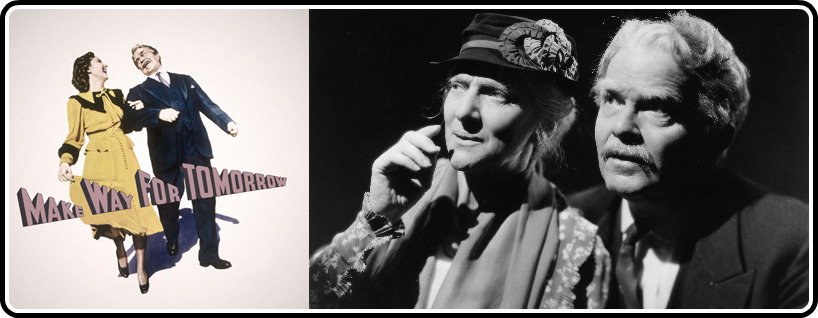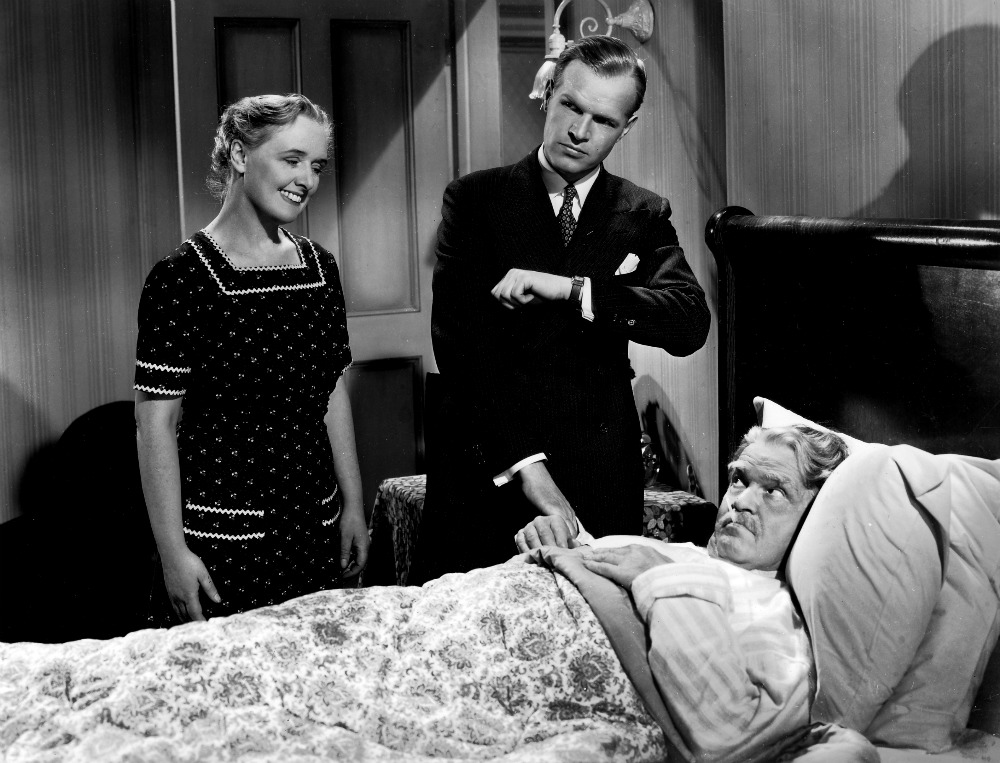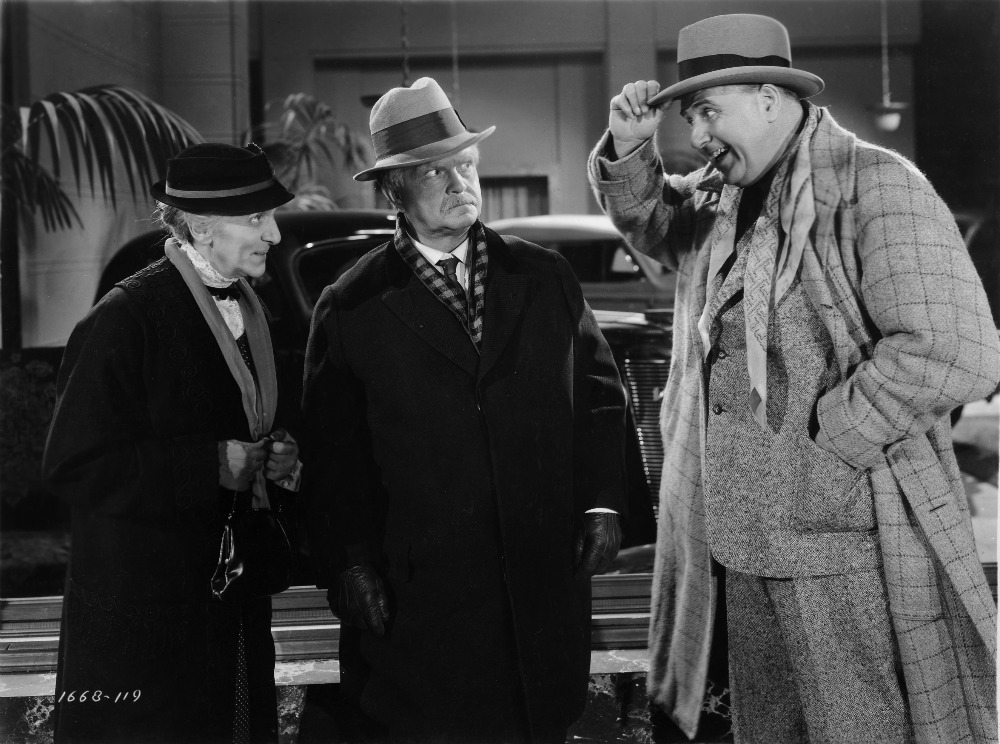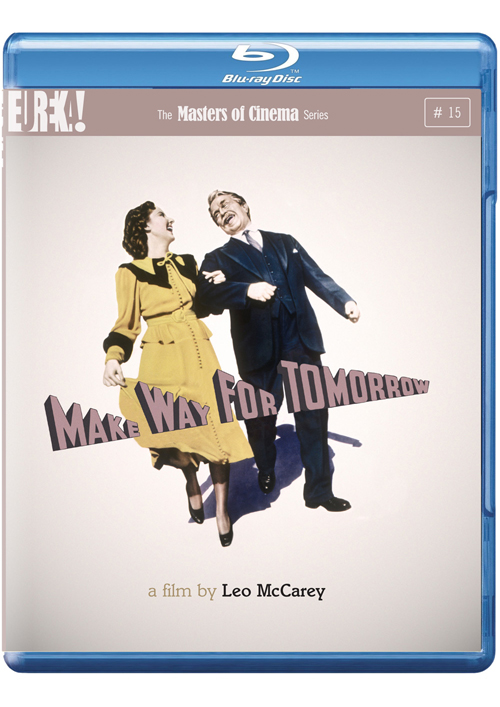Two old-fashioneds, for two old-fashioned people.
Sometimes you hear about a film for years, from your grandparents, from friends and colleagues in the business. A film that you just hear mentioned at different times of your life. It sticks in your mind and then one day you sit down to watch it and it’s more than you could have ever imagine. A holy grail of a film, if you will. That film for me is Leo McCarey’s Make Way For Tomorrow from 1937. The Criterion Collection released their version earlier this year but this is the review for the Masters of Cinema one. If you’re not familiar with MoC, they are a UK company, through EUREKA, which prides itself as a showcase for the best and brightest of film and filmmakers. Many compare them to the Criterion Collection, which is a fair assessment.
Make Way For Tomorrow is a Depression-era film, dealing with what happens when an elderly couple (Victor Moore and Beulah Bondi) loses their house and are forced to to lose their house. They do have five children but none of them will take them in, and the film deals with the pain, anguish and the frustration of the generation gap, especially in that time period.
Leo McCarey weaves a story that was happening in the years during the Great Depression. These sad stories that nobody was showing on the screen, because as a society nobody likes to be reminded of the pain around them. While their kids are prospering and doing well, their parents are part of the old generation, who are still constantly suffering from the Depression and can’t dig themselves out. He keeps an unflinching eye and hand on the film, all up until that heart shattering ending, which if you don’t shed a tear during, then you won’t ever cry during a film. Much appreciation has to be given to both Victor Moore and Beulah Bondi, who are wonderful as Pa and Ma Cooper.
As an audience, one can almost excuse the way their kids are acting and treating them. We look at old folk as a nuisance, an annoying reminder of what we’re going to become. When they are apart, the kids are finding excuses to get rid of them, be it to a sunnier climate with a sister that lives in California or to an old folks home. Choices we all are afraid we’ll come to, but ultimately we must if we still have parents who are alive and kicking. It’s the moment in the film that the parents get to have a few hours, together again, that we see their love and why they can’t ever be apart.
Filmmakers such as Orson Welles have said it’s a film that ‘could make a stone cry’ and Errol Morris, who has said it was the “most depressing movie ever made, providing reassurance that everything will definitely end badly.” Strong words for a strong film, an unsung masterpiece that will keep you asking yourself the questions these children are asking and answering. And ultimately, I don’t agree with Mr. Morris. I think it’s a film of hope and seeing these two beautiful people making the best of even the worst times, brings a smile to my face.
Masters of Cinema has put out an amazing Blu-ray of the film, the first to come out for the film. A gorgeous new transfer makes the film pop out on screen but doesn’t take away from the beauty of the black and white presentation. We get two great video featurettes. One is a 21 minute video interview with writer Gary Giddins, discussing the social and political contexts of the film and McCarey’s work. The other is a 20 minute video piece with director Peter Bogdanovich speaking about the impact of the film and McCarey’s work in general.
This is the way to see Make Way For Tomorrow. No knock at Criterion’s version, but this Blu-ray ups the ante and showcases a beautiful film the way it is meant to be seen. If you can buy it from Masters of Cinema, definitely do so. One can hope Criterion will take their release and upgrade but for now we have this one, which is a worthy addition to anyone’s film collection.
Of Make Way for Tomorrow, Orson Welles told Peter Bogdanovich: ‘Oh my God that’s the saddest movie ever made.’ Long unavailable for home viewing, Leo McCarey’s personal favourite among all his films (which included The Awful Truth and An Affair to Remember) is sad, yes, but it also stands as cathartic affirmation of the dignity of human feeling, and in the testament of such achieves a subtle complexity of characterization on par with Renoir, Ford, and Hawks.
Victor Moore and Beulah Bondi, two of the great Hollywood character actors, appear makeup-aged beyond their actual years to portray the couple whose house the bank has foreclosed upon (the film was set and produced in the midst of the Great Depression), and who are forced subsequently to move into their children’s homes in the city. A near-musical restructuring of gratitude and debt ensues once the offspring deem the couple’s lodging an imposition: the two are separated, then reunited weeks later’¦ as they glide inexorably into an uncertain future.
Unrelentingly unsentimental, yet maintaining a balance of pathos and levity unseen in not only American studio pictures but most of the rest of world cinema, Make Way for Tomorrow exerted a powerful influence on Yasujirô Ozu’s Tokyo Story and several other key entries in the Japanese master’s body of work. It is a film profoundly concerned with questions of filial obligation and the way we treat one another as human beings; it is a film that, to give Welles the last word, ‘could make a stone cry.’ The Masters of Cinema Series is proud to present Leo McCarey’s truly great Make Way for Tomorrow for the first time on Blu-ray anywhere in the world.
- Gorgeous high-definition transfer of the film in its original 1.37:1 aspect ratio
- 20-minute video piece with filmmaker and writer Peter Bogdanovich (The Last Picture Show; The Cat’s Meow) discussing the film and Leo McCarey’s career
- 21-minute video piece with writer Gary Giddins discussing McCarey’s work and the social and political contexts of the film
- Optional English SDH subtitles for the deaf and hearing-impaired
- Lengthy booklet featuring a new essay on the film by writer and Library of America editor Geoffrey O’Brien, and an excerpt from Josephine Lawrence’s source novel Years Are So Long






![MAKE WAY FOR TOMORROW [US 1937] FAY BAINTER, THOMAS MITCHELL](https://criterioncast.com/wp-content/uploads/2010/10/MAKE-WAY-FOR-TOMORROW-MoC-Press-5-1000x743.jpg)


![Bergman Island (The Criterion Collection) [Blu-ray]](https://criterioncast.com/wp-content/uploads/2022/11/bergman-island-the-criterion-collection-blu-ray-400x496.jpg)
![This Is Not a Burial, It’s a Resurrection (The Criterion Collection) [Blu-ray]](https://criterioncast.com/wp-content/uploads/2022/11/this-is-not-a-burial-its-a-resurrection-the-criterion-collection-blu-ray-400x496.jpg)
![Lars von Trier's Europe Trilogy (The Criterion Collection) [The Element of Crime/Epidemic/Europa] [Blu-ray]](https://criterioncast.com/wp-content/uploads/2022/11/lars-von-triers-europe-trilogy-the-criterion-collection-the-element-of-400x496.jpg)
![Imitation of Life (The Criterion Collection) [Blu-ray]](https://criterioncast.com/wp-content/uploads/2022/11/imitation-of-life-the-criterion-collection-blu-ray-400x496.jpg)
![The Adventures of Baron Munchausen (The Criterion Collection) [4K UHD]](https://criterioncast.com/wp-content/uploads/2022/11/the-adventures-of-baron-munchausen-the-criterion-collection-4k-uhd-400x496.jpg)
![Cooley High [Criterion Collection] [Blu-ray] [1975]](https://criterioncast.com/wp-content/uploads/2022/11/cooley-high-criterion-collection-blu-ray-1975-400x496.jpg)